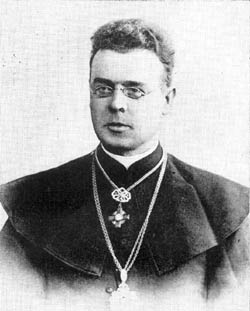
Editor of this issue: A. Mickevičius
 |
www.lituanus.org |
|
Copyright © 1963 Lithuanian
Students Association, Inc.
Vol. 9, No.1 - 1963
Editor of this issue: A. Mickevičius |
|
MAIRONIS

The spirit and ideals of Lithuania rising to its independence early this century were beautifully expressed by the great poet Maironis (real name J. Mačiulis, 1862 -1932). He was born in Raseiniai district, was ordained a priest, and held a professorship in St. Petersburg and later in the theological seminary and university at Kaunas. With his collection of lyrics "Pavasario Balsai" (Voices of Spring), and longer poems "Jaunoji Lietuva" (Young Lithuania), "Raseinių Magde" (Maggie of Raseiniai) and "Mūsų Vargai" (Our Trials), he earned for himself undying fame in the annals of Lithuanian life and letters. He has also written several historical dramas, "Kęstučio Mirtis" (The Death of Kęstutis), "Vytautas pas Kryžiuočius" (Vytautas with the Crusaders), and "Didysis Vytautas Karalius" (King Vytautas the Great). Maironis was not only a poet, but a modern Lithuanian prophet. With his unmatched verses he roused the nation, by speaking of Lithuania's natural beauty, recalling the great and ancient past and recounting the glorious deeds of the ancestors of the Lithuanians. He inspired all with the love of their country, its language, and its people. Although he preached the gospel of national resurrection, one must not conclude that he stooped to a mere utilitarian form of verse making. His poetic talent was great, and his wings of inspiration carried him over such wide expanse, that he was able to avoid all didacticism; the poet became identical with his ideal, he and his people whom he was leading were a single entity. Maironis was not only one of the most distinguished fashioners of poetic language and verse form, but he was also unreservedly the most popular poet. His clear, euphonious speech, sincerity of feeling, and easily comprehensible ideas drew him close to everybody. With the new present occupation of Lithuania Maironis' poetry became a source of inspiration again. To the Lithuanian people, burdened with new oppression, his words are a source of spiritual strength and a promise of ultimate victory—freedom.
SONG OF ANTIQUITY
Word is here, from as far as Vilnius:
Saddle the steed.
In Marienburg Teutonic knights move to destroy us.
Goodbye, dear heart, my sister! Be still. Wait for me.
If I not perish, I shall
return, joyous.
A long time now, Teutons gather their precious
wealth:
gold spires, and chests of silk, soft to the feel.
Dear love, you'll have a silk scarf and a belt of gold,
and I, a Prussian sword of
tempered steel.
Spring's dawn has broken, and the lark sings on
forever.
Where is my lad, my love? Why does he not return?
At sunset there was battle. Blood poured down and wasted.
My love fell for his homeland.
And I mourn.
Ladies, companions, sing their joy, adorned in silks.
My tears burst out and shine. I see the graveyard stand.
Dearest one, you'll not speak small words of love to me,
nor slip the golden ring on a
white hand.
Translated by CLARK MILLS
LITHUANIA
The Nemunas flows in strong repose
And waters our native soil.
Birutė's song in our brother's tongue
Can lighten the ploughman's
toil.
As our rivers cross
the eternal strand,
So shall our songs resound in
every land.
Where the jewels gleam, where the rue is green
And graces a maiden's wreath,
Where the cuckoo's cry fills the forest
high,
Our cottages stand on the
heath.
Where the rue blooms
and speckled birds rejoice,
There our mother awaits the
wanderer's voice.
When the sun of spring scatters
shades from the ling,
When the hay meets the
reaper's hand,
When the stubble-corn is all cold and torn —
Ever fair is our native
land.
In winter's snows, in
summer's ecstasy,
None is dearer, lovelier than thee.
In the sun's bright rays or in
clouded days
Our heart returns to our
home,
Where our fathers rest and their memory is blest,
Where our sweat has
watered the loam.
In joy and hardship,
quietude and strife,
Be the land beloved more than
life.
There the boyars rode to their
Prince's abode
And made the Teuton
flee.
Our homage is due and our hearts are true
To the land of our liberty.
In her cause our fathers
strove and bled,
In her cause our blood shall
yet be shed.
May the Lord of grace defend the
place
Where the bones of our
ancestors lie. May
Thy powerful hand protect the land
Where Thy children suffer and
die.
Shed still upon our home Thy
mercy's light;
Still hear us, Lord of
everlasting might.
Translated by RAFAEL SEALEY